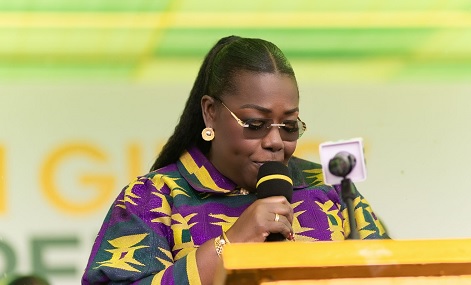The government has earmarked GH¢33.3 billion in the 2026 budget to the Ministry of Education for its programmes and activities in 2026, the First Lady, Lordina Dramani Mahama, has reiterated.
She said part of the amount would be used to complete abandoned E-blocks and expand educational infrastructure across the country.
In a speech delivered on her behalf by the Deputy Chief of Staff, Administration, Nana Oye Bampoe Addo, at the 79th Speech and Prize Giving Day of Aburi Girls Senior High School last Saturday, the First Lady said the allocation reflected President John Dramani Mahama’s national Reset Agenda and determination to strengthen every level of education, especially senior high schools, as a foundation for national development.
Mrs Mahama said the GH¢2 billion of the amount would be used to fund the construction of 200 new junior high schools, 200 primary schools, 200 kindergartens, 400 teacher bungalows and 400 sanitation facilities across the country.
A further GH¢157 million has been earmarked as Capitation Grant to enhance teaching and learning, while GH¢292 million is dedicated to supplying free sanitary pads to girls nationwide.
Besides, an additional GH¢9.9 billion has been allocated to the Ghana Education Trust Fund (GETFund) for projects in the educational sector and scholarships for brilliant, needy students.
That, Mrs Mahama said, would create space for the growing student numbers and help eliminate congestion in schools, particularly in areas affected by the previous double-track system.
Event
The occasion was marked on the theme: “A Legacy of Light: Influencing Future Generations”.
![]()
Some old students at the event
Prizes were presented to outstanding students, recent graduates and staff members for their achievements.
The 2000 year group contributed to the anniversary by refurbishing the school tower.
The event drew a large crowd of parents, alumni and other dignitaries that included traditional leaders, the clergy and political figures.
Feeding programme
Mrs Mahama also announced that the government had decentralised the National School Feeding programme to strengthen food security, improve accountability and enhance nutrition among students.
The policy, she said, was approved by Cabinet on November 7 this year, which placed procurement of key food items directly under the Conference of Heads of Assisted Secondary Schools (CHASS), while ensuring that grains, poultry and eggs were purchased exclusively from Ghanaian farmers.
She explained that the National Food Buffer Stock Company (NAFCO), working with the Ghana Commodity Exchange, would supply an additional 12 essential food items to all senior high schools across the country to supplement the six grains that CHASS had been mandated to procure.
According to her, the revised arrangement was expected to enhance logistical efficiency, stabilise food supply chains and ensure that quality, locally produced staples remain central to student meals.
The approach would not only solve supply delays but also align with the government’s Made-in-Ghana agenda, the First Lady stated.
AI
The First Lady acknowledged the advantages artificial intelligence (AI) and social media brought to learners, but cautioned against the growing trend of the youth seeking online popularity through controversy, insults or inappropriate acts.
“These paths do not build character. They do not reflect the values that Aburi Girls stands for: integrity, humility, wisdom, and a legacy of light on the hill,” Mrs Mahama said.
She encouraged the school and alumni to introduce short courses in media literacy, AI, digital creativity and content development, to equip students not only academically but for the expanding digital economy.
The Chief Director of the Ministry of Education, Lydia Obenewah Essuah, emphasised the importance of maintaining a high-quality educational system that supported national development.
She reiterated the ministry’s commitment to working with partner agencies to ensure that Ghanaian students benefited from improved teaching standards and robust learning environments.
Report
In her report, the Headmistress of Aburi Girls, Wilhelmina Obuobisa Atakora, outlined several long-standing challenges confronting the school, including inadequate furniture, uncompleted staff accommodation projects and a persistent water supply problem.
While celebrating the school’s academic successes and achievements in co-curricular activities, she appealed to the government, alumni and stakeholders for assistance.
The President of the 2000 year group, Akua Boahemah Owusu-Sekyere, joined by other members and the Special Aide to President Mahama, Joyce Bawah Mogtari, inaugurated a refurbished school tower as part of the group’s contribution to the anniversary.
The President of the year group expressed gratitude for the opportunity to support their alma mater and commended her mates and the broader Aburi Girls community for their commitment.

